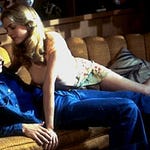Twin Peaks originally ran for two seasons on ABC from 1990 to 1991. A running joke on the show was that FBI agent Dale Cooper, the protagonist, really liked coffee and cherry pie. He was always complimenting establishments on their coffee and cherry pie, while recommending them to other people. To an audience in the early 1990s, this must have been very funny. But the humor of a guy really liking coffee was lost on me watching in 2025.
In the 2017 remake of Twin Peaks on Showtime (spoilers beginning here), Dale Cooper returns in a catatonic form. This Zombie Cooper really likes coffee and cherry pie. Whenever we arrived at a moment where his old self comes out after he has seen coffee or cherry pie, I would feel this sense of anticipation and enjoy the predictable punchline. Man likes coffee is not funny to me. But a character I’ve grown to know and love returning after a quarter century in a different form – and liking coffee – is a thought that brings me overwhelming joy.
“The past is a foreign country.” With the invention of TV and movies, we can visually and audibly experience the kinds of situations and jokes people once found funny, what they feared, how they expected the sexes to relate to one another, and more. Even if previous eras put less emphasis on realism in art, we at least learn what was expected from individuals in terms of ideals, prototypes, and norms. Becoming familiar with characters living in one culture and watching what they are like in another, through the passage of time, can be a surreal experience.
Of course, all of us who were alive in 1990 and are still here today have had to adjust to new social realities, but in real life the shift is so gradual that its shock is diluted throughout countless small experiences reminding us that the past is always incrementally slipping away. Only through fiction can we fully experience getting to know characters living in one generation and then suddenly seeing what they are like in the next. The fact that this premise is so interesting is why you’ll often see novels, shows, and movies about an individual waking up from a coma, or in a variation of that theme, people living in a foreign country and then coming back, which is the premise of the King of the Hill remake.
This is part of the appeal of the Twin Peaks story. Tyler Tone originally convinced me to get into this universe, and he now joins me to discuss the series, with a particular focus on The Return.
We spend time on the aesthetic shift between the original and the remake. As argued by Jonathan Foltz, the story is much more thematically and geographically sprawling than the original, reflecting what has happened to American culture since the early 1990s.
The first series offered an idealized vision of small-town America – albeit with a dark underbelly – while the 2017 series feels haunted by economic decay, addiction, and disconnection. We reflect on how Twin Peaks originally brought tens of millions together on network television, while The Return premiered on a premium TV channel and streaming service with orders of magnitude fewer viewers.
The conversation begins with a discussion of the subplots and character arcs, before getting into larger questions about the series. We reflect on how The Return withholds the Cooper fans expect, offering instead Zombie Cooper as Dougie Jones and the evil Mr. C. I take the fact that we don’t get the Cooper we remember until late in the show as a sign that he’s too good for the culture we’ve created. As viewers have come to expect anti-heroes, an unblemished classic hero is difficult to imagine. I talk about how pro wrestling changed over the 1990s, reflecting the larger cultural shift, and the move away from clear cut good guys and bad guys. There is something similar going on with the original Sheriff Truman, who is omnipresent throughout conversations and via his brother and namesake, while never actually showing up.
At some point, we also discuss how the original “Bob” really doesn’t work in 2017. I guess in 1990, a plausible symbol of evil was a guy who looks like a janitor in a denim outfit? Such a figure is laughable today. Maybe Bob takes whatever form represents evil in a particular cultural context. If so, it’s interesting to think how out of place the original character looks from our vantage point.
I was hit hard by the storyline with Bobby and Shelly. David Lynch first led us on to believe that they were still together. Then in the middle of what looks like a family discussion, the young criminal comes out and takes Shelly away. Bobby is defeated. The entirety of Shelly’s past is seen in a different light. She wasn’t a victim of Leo; he was the kind of man she sought out, with her daughter falling into the same patterns.
The seeming revelation that something similar happened between Ed and Nora at first compounded the original despair, but their relationship then moves in the opposite direction. Tyler and I speculate on why the two love stories end up differently.
We discuss David Lynch’s politics. Tyler informs me that he voted for Gary Johnson in 2016. I note that the clearest tell that he was a rightoid is that he didn’t cast many nonwhites in the series, except for Asian females. See in particular the scene where the tiny girl is put on the ground and crawls on the floor. Relatedly, there’s the fact that the Twin Peaks universe caters to the male gaze as a more general matter. This appears to be the role of Tammy, who serves as the sidekick to Lynch himself. As mentioned in my review of that film with Rob, I’ve always thought that the point of Mulholland Drive was to put two beautiful actresses in sex scenes together.
We spend some time on the Dr. Jacoby storyline. To me, it’s interesting that the two people who we see enjoying his show are Nadine and Jerry. All three of these individuals are B characters throughout the series. Are those the ones who get into paranoid right-wing politics? Tyler questions whether Dr. Amp is actually right-coded, but I think I convince him by pointing to the shovel scam and the Americana iconography. It is true there are some more left-wing critiques in his rants, and this shows Lynch being ahead of his time, given the MAGA-MAHA convergence we have witnessed.
Ben Horne makes occasional appearances to show us how men have changed. Before, he had sex with his subordinates. Now he doesn’t. Not because he’s afraid of being cancelled, but because that’s not what we expect from older men in positions of power anymore. He’s kind of dead inside, compared to the energetic and jovial character he was a quarter-century ago, so this really doesn’t seem like a celebration of the feminization of the world.
And then there’s Audrey. I was in shock watching her first appearance. You can see the same facial expressions, patterns of speech, tics and eccentricities. But what was cute or could even make a man fall in love with a woman in her twenties – the frivolity, indecisiveness, arbitrary and fierce passions – is unsettling in one who is deep into middle age. Only the mole remains unblemished as a commemoration of the past. Shelly in contrast is still beautiful, and it seems like Lynch made Audrey look particularly bad to drive the point home. People talk about her storyline, and much of The Return, as an assault on the concept of nostalgia, but here the lessons are heightened as we’re reminded of one of the cruelest facts of human existence: women age.
After exhausting some of the main subplots – I don’t think we could’ve gotten to all of them, even with much more time – we move on to larger themes. The show, we agree, is less about solving mysteries than about resisting the very idea of resolution. Tyler emphasizes that he doesn’t particularly like the idea of worrying about plot details, but rather seeks to experience the director’s larger vision. He mentions the four and a half hour YouTube video that seeks to explain the series, which I’m just starting to get through.
I ask about the significance of the episode centered around the detonation of the atom bomb. Tyler argues that we shouldn’t think about this as a scientific explanation of the main plot, but rather see nuclear weapons as a symbol of man becoming alienated from his nature and losing control. We talk about nuclear weapons as the symbol of man-made danger versus AI, with me arguing that the latter is much more depressing as the crowning achievement that might destroy us.
Nuclear weapons are cool. They’re just machines that are doing more of the thing that machines do, that is rearranging matter. AI cuts to the core of who we are, and while there will be a lot of great applications going forward, it is also drowning the world in slop. Fine, slop is not Hiroshima and Nagasaki, but I don’t know, I find slop worse. This is the technological version of hating pronouns more than genocide, even though I’ve become so polarized against MAGA liars that I can’t even hate pronouns all that much anymore. And of course, if you listen to Eliezer, AI is much more dangerous than nuclear weapons anyway.
We close the conversation by discussing the final episodes, particularly Cooper’s surreal re-entry into an altered timeline. Does he really believe he can save Laura Palmer? Was the lesson that he was being too hubristic, or something else? Tyler presents a popular theory that the ending was, despite all appearances, a happy one. I like having that out there as a possibility.
Regardless, if there’s one rule of watching Twin Peaks, it is to remember that the point is not narrative closure. The show is a reflection, telling us who we are and what we’ve become. I don’t think the reality of our modern culture is as dark as Lynch believed it was. But we can’t lie to ourselves and say we haven’t lost something. And we cannot find redemption in nostalgia in a world where rapid societal changes are constantly making a mockery of what we have loved.











